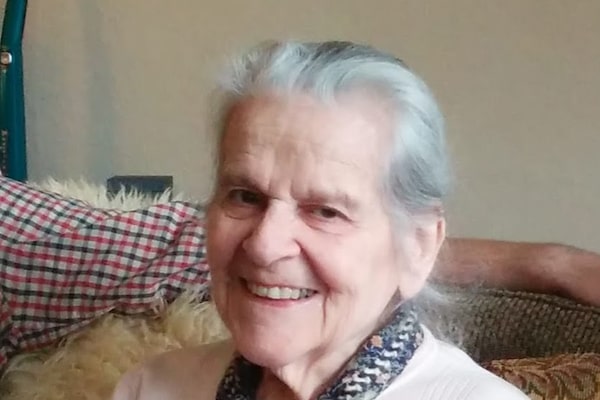Susan Szoke: Survivor. Caregiver. Humanist. Pacifist. Born Aug. 8, 1924, in Budapest, Hungary; died Jan. 3, 2022, in Toronto, of COVID-19; aged 97.

Susan Szoke.Courtesy of family
Susan Szoke was born Zsuzsanna Rochlitz and grew up in a progressive Hungarian Jewish family that counted among its members some of Europe’s feminist pioneers (she was even delivered by Hungary’s first female physician).
Her father, Zoltan, was a proud Jew but had no time for what he considered to be meshuga (idiotic) religious customs. He ran an estate farm that specialized in pig-fattening. Janka, her mother, worked as a school teacher before marrying Zoltan and helping to run the farm. Listening to Susan’s stories, one had the impression of a family in which every relationship was characterized by mutual adoration. She credited her idyllic childhood with giving her the strength to survive the horrors and hardships that were to come.
Deported to Auschwitz-Birkenau in 1944 at 19 with her parents, brother Peter and 31 extended family, only Susan would return. She survived Joseph Mengele’s medical experiments before being enslaved in a weapons factory. Diphtheria almost killed her, but she was saved by a nurse who secretly provided her with care.
After liberation, Susan returned to Stalinist Hungary. Her grief left her living in a kind of emotional fog for a long time. She slept all day and sewed doll clothes at night to make money. She had always wanted to work with children and eventually got a job in a nursery school. She married Janos Szoke, the son of her family’s doctor during her childhood. He was also a survivor but had lost his first wife, who was pregnant when she was murdered. He bore deep psychological scars, and his marriage to Susan was difficult. In 1953, Susan gave birth to their daughter, Veronika.
In 1956, during the Hungarian Revolution, rumours spread that another wave of antisemitic violence was coming. The family fled to the West. Under the cover of darkness, they crossed into Austria on foot with the help of a family of sympathetic shepherds and eventually settled in upstate New York. In the early 1970s, Susan separated from Janos to escape his emotional abuse. She moved to Toronto with Veronika, in part because she was appalled by the war in Vietnam, but also to be closer to her only surviving cousin, who lived in Montreal.
In her late 40s, she returned to school and fulfilled her dream of becoming an early childhood educator. She worked in a daycare for newcomer families, which she called her “little United Nations.” She took special pride in working with the children of refugees. She retired in the late 1980s.
Susan was a dedicated and passionate caregiver, but her many traumas had stolen her capacity to be connected in the ways that those whom she cared for needed most. As a parent, she needed to be so close as to be suffocating, and yet she was always emotionally distant to an extent that was damaging. It was a tragic irony that she could not build with her own child the kind of deep bond that she described experiencing in her own family and considered to be the source of her remarkable resilience. She could not stop the trauma from moving to the next generation.
Later, Susan dedicated herself to mastering the art of babushka-clad Hungarian grandmotherhood. Year after year, she cooked immense quantities of delicious food, divided it into individual portions, froze it and distributed it to everyone in the family, even to those far afield. When her grandson Peter attended university in Halifax, she once sent him avocados in the mail because she’d found some particularly nice ones.
She craved the safety found in consistency, living in the same apartment for the last 50 years of her life. She never owned a television or a computer and used a rotary phone until the bitter end. She read the paper every day and spoke out strongly against the political right, whether in Canada, Hungary or Israel, often with merciless humour.
Susan carried forward her family’s strong pacifist and humanist traditions, refusing any suggestion that war could ever be justified or hate ever rationalized. Her family cherishes that legacy most of all.
Peter Trainor is Susan’s grandson.
To submit a Lives Lived: lives@globeandmail.com
Lives Lived celebrates the everyday, extraordinary, unheralded lives of Canadians who have recently passed. To learn how to share the story of a family member or friend, go online to tgam.ca/livesguide